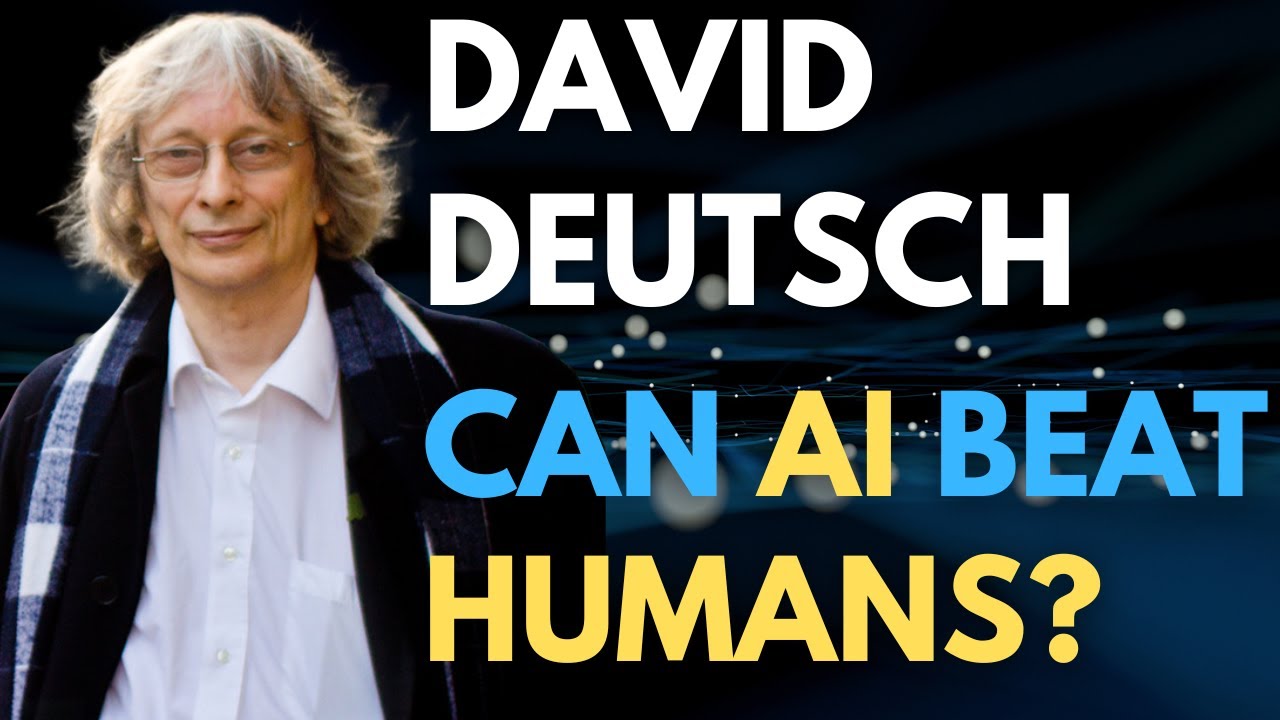Dwarkesh Patel
David Deutsch is the founder of the field of quantum computing and the author of The Beginning of Infinity and The Fabric of Reality.
Read me Contra David, on AI: https://dwarkeshpatel.com/universal-explainers/
Buy The Beginning of Infinity: https://www.amazon.com/dp/0143121359/
Episode website + Transcript: https://www.dwarkeshpatel.com/p/david-deutsch
Apple Podcasts: https://apple.co/3PZXA1j
Spotify: https://spoti.fi/3Q4fmjS
Follow me on Twitter to be notified of future content: https://twitter.com/dwarkesh_sp
Follow David on Twitter: https://twitter.com/DavidDeutschOxf
Timestamps:
0:00:00 Will AIs be smarter than humans?
0:06:30 Are intelligence differences immutable/heritable?
0:20:08 IQ correlation of twins separated at birth
0:27:08 Do animals have bounded creativity?
0:33:28 How powerful can narrow AIs be?
0:36:55 Could you implant thoughts in VR?
0:38:45 Can you simulate the whole universe?
0:41:19 Are some interesting problems insoluble?
0:44:55 Does America fail Popper’s Criterion?
0:49:57 Does finite matter mean there’s no beginning of infinity?
0:53:12 The Great Stagnation
0:55:30 Changes in epistemic status is Popperianism
0:59:25 Open-ended science vs gain of function
1:02:51 Contra Tyler Cowen on civilizational lifespan
1:07:16 Fun criterion
1:14:12 Does AGI through evolution require suffering?
1:17:57 Would David enter the Experience Machine?
1:20:05 (Against) Advice for young people
Source




If you enjoy this episode, please share it to your friends and on social media! Word of mouth helps out tremendously! Thanks!
David’s answer to the last question was truly incredible. Such a unique mind, he has.
Nice interview. Dr. Deutsch is an astonishingly original intellect. The sort that changes paradigms.. Thanks.
I love David Deutsch, his thinking is so clear – a real gem of a human being
Excellent content! Thanks.
You should make a separate clips channel and post the clips there.
Deutsch seems to be against any genetic explanation for IQ, no matter how robust the findings.
I found it interesting when you were speaking about a universal explainer "wanting" to learn something, but just not "wanting" it enough to actually learn it. I think a good word to use is gumption. A universal explainer can want to learn something, but not have the gumption required to. In that way, gumption seems to be an extremely important piece of software, that serves as a prerequisite for obtaining higher-order knowledge.
Don't think his answer at 55:00 was satisfying.
This interview Dwarkesh Patel, did not help anyone.
That's a number too big for you.
You were fighting a losing battle.
I found your blog post discussing Deutsch's views on AGI extremely well done.
Excellent interview. Very shareable.
What an absolutely clear thinker! Thanks for this Dwarkesh!
Lex Fridman is missing out BIG TIME!
Brilliant insight by the guest on so many issues. The recognition that AI is fully distinguishable from creativity is spot on. AI is a correlation machine, a good one.
"Let's say their lives are filled by concepts of pride manliness fear… As let's say prehistoric people," and a few contemporaneous groups camped out in various breakwaters.
For the interviewer: people perform to the expectations of others, especially children, children who look a certain way get treated favourably. I can think of millions of other reasons why genotype can be correlated to a specific phenotype that is environmental
what he says about "pure consciousness" at around 37:39 just being imagining an empty cartesian theater is correct imo, and a deep meditation insight. Many meditators get stuck at the "pure consciousness" phase, but don't deconstruct that and realize it's just an empty thought too
I think Sam Harris is probably stuck at the "witness" stage of enlightenment, which isn't particularly far along the path
more on this stage: https://www.youtube.com/watch?v=cUFbfQ9xyCs
How do you have so many crazy guests and only 10k views??
I feel like either DD or Wolfram will find the final theory of fundamental physics.
David Deutsch is a genius, and a wonderful lecturer. Yet, after watching this video, I came away with almost no additional knowledge or understanding of the issues discussed. Perhaps the fast-talking interviewer failed to frame questions with the viewers in mind. Whatever the reason, in this interview, neither the interviewer nor Deutsch was at his best.
IMO it's definitely the culture in the labs. I haven't worked doing gain of function research or any kind of viral genetics research, but the biological science community is relatively small. I attended undergrad courses with several people who actually went on to do research in those areas. I've worked in several immunology labs myself, so there's a lot of crossover. The culture in this community could use improvement. There is this cultural reality that permeates public and private bio labs that it's not okay to say "I don't know." The number of times I've caught absolutely brilliant people lying about how much they know is legion, which is kind of ridiculous. Nobody should think them less intelligent because they lack knowledge about some esoteric factoid they've never been exposed to, but that's the feeling they get. I'm embarrassed to admit that I've tended that way myself on some occasions. Social shame is a MF'er.
This man is brilliant.
He assumes all 'intelligence' is rooted in the brain. I am pretty sure we know this not to be true.
Great interview, interesting questions.
If I may suggest one thing, try and slow down your speaking a little. Take a breath :). Great work though!
I wonder, does artificial general intelligence truly need to be self-directed? To have goals, motivations, and thoughts? Or does it simply need to be cognitively flexible, a machine that requires input and gives output to all the problems we give to it?
A genius speaking with a mentally fragmented dilettante.
Concerning "Wanting to learn Mandarin": Of course you can learn Chinese if your language network in your brain isn't neurologically damaged or underdeveloped. It is about prioritizing the many things in life that you want and have to do with finite resources in a finite time span. So this is a resource management issue. With only one problem ahead of you, you probably can solve the one problem (especially if you apply minimal "success" criteria). But in the face of the many problems, you will have to allocate.
What people from highly industrialized, academic populations understand as intelligence as measured by their IQ tests, is very specific to their specialization in the job world. The IQ tests are testing only a fragment of cognitive abilities, very much biased towards certain academic disciplines and target groups and very much limited to what they think as measurable in their terms of standards. Secondly, the correlations of IQ with anything are quite low. I have learned in my psychology studies that there are correlations that are higher than others. And that's it. Doesn't mean there good to explain a relationship and doesn't mean they are THE relevant relationships of the relationships one would have to look at. ONce you have understood these rather HUGE limitations, you should also integrate them in your world view when interpreting other relationships.
This is a very nice interview. The interviewer tells his opinion free from the often seen reticence that interviewers have in front of guests with significant reputation and he remains respectful and gives him space. This leads to a really interesting and helpful conversation, where you can learn something, where basics are addressed that are necessary to understand the stuff that is talked about.
I am often amazed that people so often talk about humanity as a whole. And describe things/actions on a collective level that are so much less manageable for them than if they were talking about specific populations that they can better assess. Mostly also actually specific populations are meant, or the collective whole is simply attributed characteristics of much smaller and specific populations, but then again conclusions are derived for ALL. The fact that people simply do not get this clear is a psychologically extremely interesting phenomenon and says a lot about our way of thinking. Of course, the degree of inadmissible generalization varies, but being spontaneously careful not to generalize inadmissibly seems to be a not too common talent.